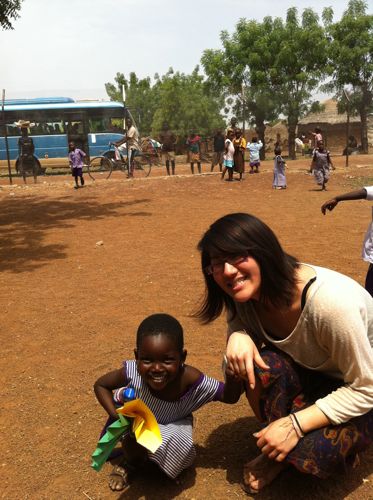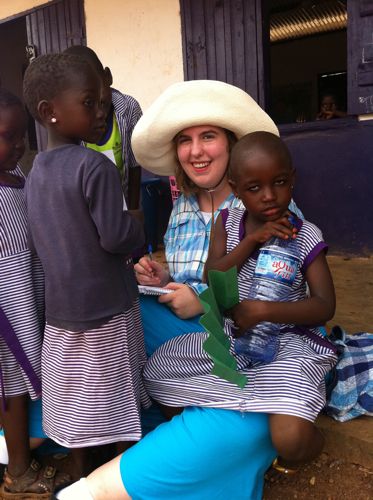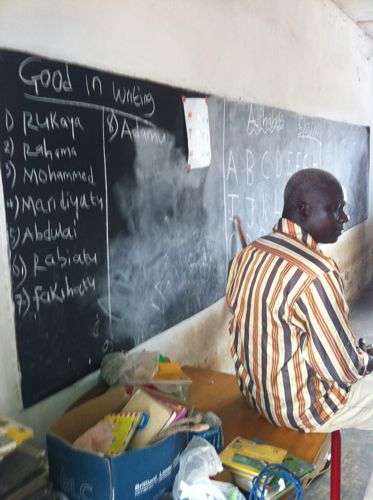Serendip is an independent site partnering with faculty at multiple colleges and universities around the world. Happy exploring!
Ed 250: Literacies and Education
Welcome!
This is the online community conversation and resources space for Education 250: Literacies and Education, a course in the Bryn Mawr/Haverford Education Program taught by Professor Alice Lesnick. Please feel free to join us -- via individual and course blogs and mico-blogs (via Twitter) -- as we explore literacy learning as a process of ongoing personal, cultural, and political negotiation and invention among and across people’s ways with words. The focal contexts of our studies will be the U.S. and West Africa, specifically Northern Ghana, where some of us will travel over spring break as part of the interdisciplinary cluster of courses making up 360: Learning and Narrating Childhoods.
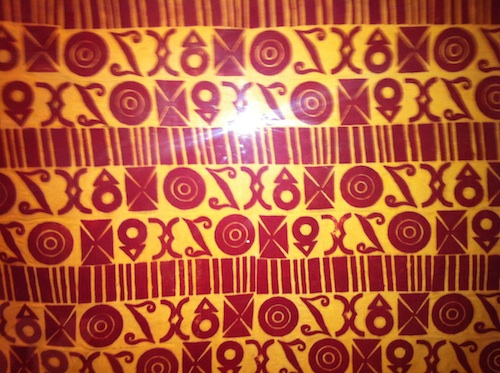
About the Learning and Narrating Childhoods 360
About Titagya Schools and Ghana
NEW:
Interactive Blogging: Reflections, Connections, Questions, and Information

NGOs in Ghana – intial reflections on group project & trip
While in Ghana, I couldn’t help but think about my group’s discussion of NGOs in Ghana and their work, and compare these things to the realities that we saw on the ground. I still have a lot of questions, but my post is long overdue, so observations + questioning will have to be sufficient for now!
During our project, one of the more resonant questions for me was, “How do NGOs collaborate and is this collaboration successful?” I think this question guided some of my observations during the trip.
Observations: Looking around the Dalun Youth Association (DYA) building, I saw some posters, asked some questions. All this happened very quickly, so I’m not 100% this is the correct information, but I’ll relay what I remember and wrote down.
DYA exists to bring the youth together – students gather here and “because they are together, they are stronger and can advocate for the needs of the community, what they see the community needs to develop” (field notes), like new roads to Tamale (which I would also advocate for, for both selfish and unselfish reasons). DYA uses sports as a tool for development – in this rural community, athletic competition is a perfect way to bring people together, both young and old. Once the people are gathered, the youth can spread their message of change. And this message is much more powerful coming from a vibrant, organized youth group.
Children's Literature in Ghana
This post is to reflect on the process of researching children's literature in Ghana and share what this research project has taught me. Besides the obvious process of learning something new about a country I was generally unfamilar with, this project gave me a chance at reimaging literacy from a different point of view. I found it difficult not to compare my own life as a child with the children who were reading the literature that we researched. Until recently, children's literature in Ghana was imported from other countries and featured characters that were completley dissimilar from the readers. Children who wanted to read or who were told to read had no choice of what they would like to read; they associated books with only having characters that were unlike them. Relating to the content of the story was difficult and encouraged these children to think in a way that devalued their own identity because of the emphasis on other stories.

Ghanaian Early Childhood Literature-group project reflection
The component of my group project on Ghanaian children's literature that I found most provactive returned to the notion of identity that we have already touched on throughout the semester. In researching the growth of children's literature in Ghana, the same emphasis on the necessity of familiarity came up. For too long, Ghanaian children, if exposed to age-appropriate literature at all, were confronted with stories of white children, apples, rain and snow--stories that in no way related to their own experiences. The content was irrelevant to their lives. Beyond the simple misfortune of this fact, I am sure such books were entirely confusing as well.
I tried to convert this issue of identity and accuracy to my own life. But as a white, middle class girl, the content of the literature I read was never an issue. The characters looked like me, talked like me, lived in houses like me and even faced the same challenges I did. The stories I read as a child acted as an affirmation of my life, proof that my appearance and experiences were shared and "right."
I wonder then, just what the impacts of irrelevant literature have on children. On the one hand, as mentioned, I think the affirmation of experience is entirely important at a young age. On the other, exposure to other lifestyles is beneficial. Ultimately, I think it can be agreed upon that a mesh of both is ideal. Yet for too many children in Ghana this was not an option.
Friday evening in Accra
We enjoyed delicious stews and fufu al fresco at our hotel. A recent BMC alum from and now living here stopped by to day hello! The air and breezes are soft.

Greetings from Accra

We arrived after a delayed but easy flight to be met by our local guides. A taxi ride through the city to our comfortable hotel. Sights, sounds, and smiles too many/much to set down right now. This group is traveling beautifully! Paying games in the dc airport and taking turns writing and drawing in our group scrapbook are two standouts. We are freshening up before we go out to dinner together. Tomorrow we ride the bus North. Amazed and grateful, Alice
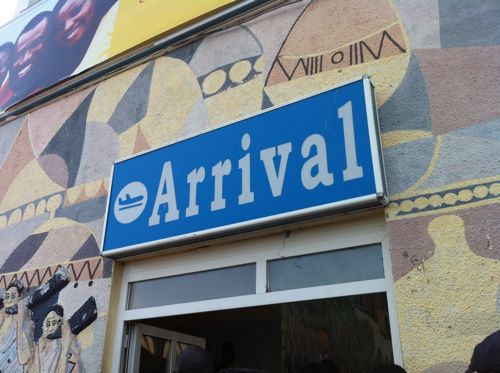
Best of luck (and have fun) in Ghana!
Best of luck to you all in Ghana! My due date is this weekend ... but I will tune in whenver I can to the new Ghana trip blog. And then... "see" you all online for the rest of the semester!
 There's a timely feature on the NPR website coinciding with your trip... Check out this recent Black History Month spot on a trip back to the ancestral home in Ghana from Tell Me More:
There's a timely feature on the NPR website coinciding with your trip... Check out this recent Black History Month spot on a trip back to the ancestral home in Ghana from Tell Me More:

Reflection on Language Diversity Presentation
This post is in response to my groups presentation on language diversity in Ghana.
I really enjoyed presenting on the languages pidgin English and twi in Ghana but I was more interested in pidgin. I found it fascinating that in using English as a medium where all ethnic backgrounds could interact, Ghanaians, particularly young people, made English their own in the form of pidgin/slang English. The concept and use of pidgin English reminded me of Decolonizing the Mind where the author writes about ways in which Africans should and could share their history and culture. However, in contrast to Decolonizing the Mind, I found it interesting that youth were, to some extent, using a combo of English and their native tongue to spread their culture when at first English was used to eliminate it.
For that reason, it is frustrating to know that pidgin is considered as an inferior language. Personally, I find pidgin to be a powerful language because it defies the dominant discourse (Western culture) forced upon Ghana by using English "improperly."
NGOs + Ghana
For me one of the most fascinating aspects of sociology is the ability to study social problems on many different, seperate but interacting elements of people and power. One of my biggest frustrations when learning and trying to understand the unfamiliar is not knowing where problems or phenomenons are situated in and what elements influence them. I wish our education, was less linear but more cyclical, converging or intersecting.
When I was in 10th grade I first learned about the IMF and World Bank in my humanities class. I did not fully understand what it meant. I didn't know just how powerful it was or how it was connected to and related to people across all levels of power, privlege, access and suffering. It is through my sociology courses that I learned about how the IMF and WB affect the Global South in detremental ways--feminizing poverty, exploiting labor, stripping access to resources and perpetuating neocolonial ideology and structure. I think it is important that how we learn, question and inquire goes beyond what is in front of us. Socio-historical context needs to be explored. Macro forces and institutions need to be taken into consideration just as much as micro forces and interactions between people.

World Travel/ Sharing Across the World
The topic I keep returning to and reflecting on is World Travel. More specifically I was thinking about World Sharing and how amazing and beneficial it could be for students to be able to share things with other students in different countries. I took Japanese my first year at Bryn Mawr and towards the end of the class we would make video files of us speaking in Japanese and English and send them to "buddies" we had in a university in Japan. They would then send us videos of them speaking in English and Japanese. We would all also type what we said in the language we were learning and then the native student speaker would correct it and write a reply in the language they were trying to learn. This was an amazing experience and obviously we were all nervous at first but you ended up really connecting with your buddy because you'd see them laughing when they knew they got something wrong or pulling their friend into the video. Obviously this requires technology and money but I just think it is such a unique way to share the experience of learning across the world.
Group Presentation
Oops! In all the pre-trip excitement/chaos I forgot to post my blog this week! I hope this reaches you all in a not TOO delayed fashion.
This week, I am going to blog about my group presentation on language diversity. Riley and I both worked on the portion of the presentation that connected the theme of language diversity, specifically in Ghana, to the theoretical frameworks we had opened in class at the beginning of the semester. Undergoing this process was highly valuable for a few reasons. For one, it gave us a way to reflect back on the texts we had read and the theories we had come to understand as valuable contributions to the discipline. Also, we were able to observe tangible situations for the theories and seem them more practically applied. Theoretical frameworks always have the ability to expand our knowledge base and encourage a deeper level of thought, and this was a very valuable experience, for the presentation, and for ourselves as well. Now looking at it and our presentation as a whole, the theory we had uncovered as pertinent to the discourse only began to brush upon the frameworks we could have opened up. Language acquisition theories would have also been a very interesting segment of theory to open up for discussion, and could have added to the overall message and value of our presentation.

Bringing it all together: reflections before travels....
I find it useful to solidify theoretical connections before traveling to Ghana for the practical side of seeing theory in action. Connecting what we've been learning back to the readings we've done helps me contextualize and reflect on what to notice while abroad, and how to make sense of it.
I'm thinking about all of the readings we've done, but particularly of María Lugones' perception of "playfulness," and how this trait develops from not being "fixed"--that is, when we embrace the reality of inhabiting different worlds (material and figurative).
I see clear connections between plurality and the dangers of thinking in hierarchies, as well as agency and how "damage-centered" thinking is not innate. We can teach ourselves to think relatively...to refrain from comparison...to see things for what they are with a critical but forgiving/relative eye. We can be open and see things from different perspectives...what we inherit is not fixed. Literacies, plurality, and playfulness go hand in hand, and are especially good things to keep in mind while traveling.
I'm really looking forward to the trip.
Discourse in Storytelling
I really enjoyed doing the activity with everyone during our storytelling presentation. When we created the activity we knew it would be interesting but I was excited to see what everyone came up with (in such little time). All the presentations were so different in medium, style, content and presentation. They all showed something different about the individuals in the group and what was important to each of them. It got me thinking back to Gee and his ideas of discourse. While all the presentations were different they all seemed to fit the standard discourse we have in academia, rather than a discourse that would have been found in a place like Ghana. What I mean is we have all been told stories throughout our lives, we have acquired (to use Gee’s word) a certain way to tell stories. They are through pictures or narrative and they all come from the narrator. We saw that in Ghana many stories involve movement from everyone or call and response, and those stories were not presented in our classroom. If they were it would have been a learned practice and the class would have been more aware of the choices they were making to tell their story in that way. I am now realizing even more how much our own discourses determine not only how we interact but also how we tell stories about ourselves (to bring in Rob’s class and Narrativity to tell about who we are). Our discourse determines how those stories look and the way they are told. Is it so crazy to ask us to step outside of our own discourse to tell our story? Perhaps it is.

Language Diversity Reflection
I was in the group that presented on language diversity in Ghana. I was talking specifically about language within the school system, and how English is currently the accepted language of Ghanaian education. It isn't until Senior Secondary School that Ghanaian students are explicitly taught Ghanaian language. This policy makes me feel sad and a little angry, the same way that it does in American schools. Last semester in Empowering Learners, I defined agency as "the learner’s decision to take ownership of the world in which he/she lives and to apply his/her skills to shape that world." This definition was very much attached to language. I see literacy as a crucial skill for shaping the world. When a school system denies a student access to literacy in their native language, the system is taking away some of that student's agency. Waiting to provide this fundamental access to students who make it into schools that have stringent academic requirements is completely in opposition to what I think needs to happen. Language skils should be built upon, not limited. It's sad that this can be influenced by politics or ideology.
Storytelling Presentation
I was really happy I chose the Storytelling theme for my group project. The research was somewhat difficult as it was challenging to find reliable sources that provided information from a Ghanaian perspective or at least from a non-biased or skewed perspective. The Storytelling presentation inspired me and it is really exciting to use the knowledge I gained from the project to create curriculum for the 4th graders I teach art to. On Friday when we taught the 4th graders we actually used the same Anansi book for their lesson. We then made “storysticks” where students drew pictures to represent a story on a cardstock piece of paper and we then folded it to make a cylinder or stick with their unique story on it. We then made spiders and students got to paint Adinkra symbols on the backs of their Anansi spiders. This project was very rewarding and the students loved it so I am thankful to have been provided information through the class and the project to share with my students. It also felt very rewarding to see how everyone engaged with our Storytelling lesson on Tuesday. I was really impressed with everyone’s stories and presentations even though there wasn’t too much time for the activity. We were able to see the many different modes stories can be told through- using drawings, words, technology, photographs. There is so much possibility and potential in telling stories.

Revisiting Freire's "Cultural Action for Freedom"
For this week I decided to revisit Paulo Freire's "Cultural Action for Freedom." I am drawn to his idea of education as cultural action for freedom. Nonetheless, it also leads me to wonder if the education that Freire describes ever truly exists. On a basic level, Freire talks about how this type of education is dialectic and involves an act of truly knowing (not just rote memorization), where one knows about his/her "concrete historical and cultural reality." However isn't history always written by the victors? And does an essential cultural reality exist? In Wozniak's psychology class we talk about the origins and development of culture. We also discuss the lack of an essential self, and so I wonder if such an essential cultural reality exists. Won't this cultural "reality" in the end be influenced by the mindset of whichever side one percieves reality to be?



